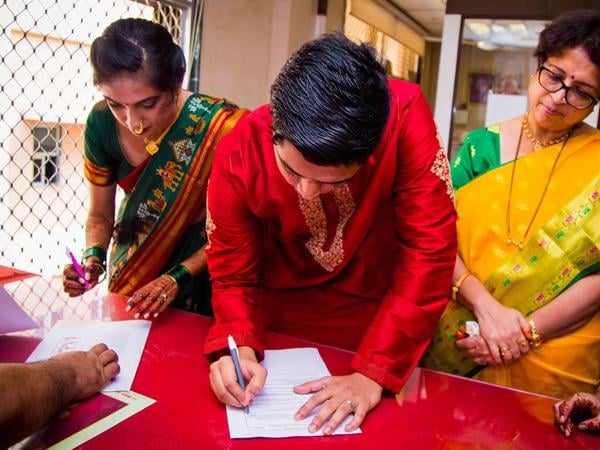Even as the Court examines whether the personal records of a couple can be made public prior to marriage and whether this violates the right to privacy, a peculiar requirement of the Act allows it.
By Ajay K. Agrawal
The Supreme Court has agreed to examine whether certain provisions of the Special Marriage Act of 1954, which allows personal records to be made available to the public for scrutiny 30 days prior to the intended marriage, violate the right to privacy of the parties.
The apex court on September 16 issued a notice to the centre after a PIL was filed by Nandini Praveen, a law student from Kerala, urging the Court’s direction to quash certain sections of the Act which hamper the privacy of couples. She said that placing these details in the public domain violates an individual’s right to privacy as guaranteed by the Constitution.
However, Chief Justice of India SA Bobde asked her counsel:
“Your plea is that this is a violation of the privacy of the couples. But imagine if children run away to get married how the parents would know about the whereabouts of their children? If wife runs away, how would the husband come to know?”
Kaleeswaram Raj, Praveen’s counsel, replied: “The question being raised here is publication of records in public domain. We are not questioning inquiries to be made by the marriage officer.” He further said: “Marriage reflects a private decision taken by two consenting adults and the Special Marriage Act was formulated to provide a secular form of marriage. By making the personal details of the couple accessible to everyone, the very right of the couple to be the decision makers of their marriage is being hampered by the State.” The petition also emphasised that no legitimate State interest was served by publishing private details of a couple in the public domain.
In India, marriages are typically governed by personal laws such as the Hindu Marriage Act, the Indian Christian Marriage Act, and Muslim personal law. However, the Special Marriage Act is a civil law and persons from all faiths, religions and castes can decide to get married under this law. But it requires couples to give notice of intended marriage to the marriage officer of the concerned district where at least one of them has lived for 30 days or more. Moreover, all details given to the marriage officer are published in a notice and publicly displayed in the marriage office. The details include their names, date of birth, age, occupation, parents’ names and details, address, pin code, identity information, phone number, etc. This is a peculiar requirement of the Act. It also mandates that anyone can raise objections to the marriage, and empowers the marriage officer to investigate them.

A 2016 report by the National Council of Applied Economic Research found that only five percent of marriages in the country were inter caste. Publishing the private details often spreads the news to the family and larger community, leading to humiliation and honour killings. More than 350 such killings have taken place across the country in the last six years. Such cases are grossly under-reported. In some states like Tamil Nadu, Punjab and Haryana, honour killings reached an alarming level, prompting the authorities to establish safe homes for runaway couples. Lack of proper legal provisions regarding prevention of honour killings empowers families to kill members who they believe have tarnished their image in society. Not only does the Special Marriage Act have to be amended, but a separate law that criminalises honour killings is needed.
There are numerous instances where inter-religious marriages have triggered turmoil in society. In 2007, Bhopal was rocked by protests after Umar, a Muslim, married Priyanka Wadhwani, a Hindu, against her parents’ wishes. Umar had changed his name to Umesh. There were protests in the city which continued even after Priyanka confirmed that she had married of her own accord and not under any pressure. Despite both being adults, the Bhopal police lodged a case of kidnapping against Umar. His brother was picked up by the Koh-Fiza police in Bhopal and detained illegally.
In February 2018, Ankit Saxena was brutally murdered in Delhi by the father and uncle of his girlfriend, Shehzadi. Her father was completely unrepentant. He admitted that he had committed the crime and said his motive was to end the relationship between Ankit and his daughter. His callous attitude even after committing such a heinous crime indicated how unacceptable inter-religious marriages are to a significant number of Indians even today.
While many Indian families practise more liberal values, when it comes to inter-faith or even inter-caste marriages, there is no significant change. While a court judgment may uphold the right of a person to choose a partner of his choice, parents often don’t accept it fully. Even the police force, which is responsible for upholding the law, often holds the same view. Thus, they end up harassing couples who have opted for an inter-faith marriage.
India is still a traditional society with a rigid religious system. Religion plays an important role in the selection of mates. To most Indians, it is difficult to think of marriage beyond one’s own religion. But this is changing slowly due to the impact of modernisation, socio-economic development and globalisation. Various socio-economic and demographic factors also affect the pattern of inter-religious marriages in India.
The Constitution gives us the fundamental rights of Right to Equality, Right of Freedom and Personal Liberty and Right to Life and all these are also conferred on couples marrying under the Special Marriage Act as well. So the government, NGOs and lawyers should take up initiatives to promote the concept of inter-religious marriage even in rural areas.
—The writer is Advocate, Supreme Court
Lead Picture: idiva.com


